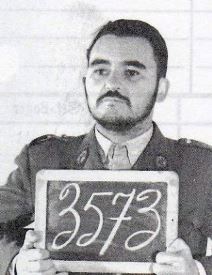Daniel NAIMAN
(Source for the aadjacent photo: Division of the Archives of the Victims of Contemporary Conflicts)
Translated from the biography established by the AFMD (Friends of the Foundation for the Memory of Deportation from the Allier department):
Daniel Naiman was born on April 2, 1910 in Bucharest, Romania. His father Simon was a merchant, and his mother Dori née DAVIDSOHN was a housewife.
He was granted French citizenship on April 15, 1937, according to the decree published in the Journal Officiel of the French Republic n° 97 of April 25, 1937, page 4671. (cf. below).
He resided at n° 37 rue Barbet-de-Jouy in Paris’s 7th district before the war.
(Source for the document below: Bibliothèque Nationale de France on the Gallica naturalizations Internet site)
He was mobilized in 1939 as a medic in the 18th Pioneer Regiment in Nancy. Taken prisoner in 1940 in the hamlet Le Rouge Gazon at Saint-Maurice-sur-Moselle (Vosges department), he was transferred to Oflag XIII in Nuremberg, where he was attributed I.D. n° 3573. (cf. below the extract from the list of detainees in that Oflag). (Source of the document: Division of the Archives of the Victims of Contemporary Conflicts).
He was freed by the Germans for health reasons or because he was Jewish and transferred on January 16, 1941 to Frontstalag 194 at Châlons-sur-Marne pending his liberation.
Back from Germany in 1941 he married Yvonne PATUREAU on June 12, 1941 in the 7th district of Paris. They went to live in Vichy (Allier department), because his wife was employed as a secretary in the Labor Ministry, which was located at n° 17 rue Alquié in Vichy.
They resided first in the Hôtel Colombia and then in the Hôtel Belle-Île, an annex of the Hôtel Plaisance. These hotels had been requisitioned to lodge the employees of the Labor Ministry.
Being Jewish, and even worse a foreigner, he was forbidden to practice medicine by the law of October 3, 1940 on the status of the Jews.
He left Vichy to go into hiding in Cindré (Allier department), a village about thirty kilometers [18.5 miles] from Vichy.
He was arrested by the Militia on June 29, 1944 “at the Hôtel Belle-Île when he came clandestinely to visit his mother-in-law, who had recently undergone an operation”, according to a note by the Renseignements Généraux [Internal Security Police] dated April 1, 1954. He was interned for two weeks in the Château des Brosses, a prison run by the Militia at Bellerive-sur-Allier (Allier department) before being transferred on July 15th to Drancy, where he was attributed I.D. n° 25162.
On July 31, 1944 he was deported from Drancy to Auschwitz in convoy n° 77.
(The document below is an extract from the list of convoy 77. Source: Mémorial de la Shoah C 77_45)
In Le Mémorial de la Déportation des Juifs de France, Serge Klarsfeld writes about convoy n° 77: “The number of deportees was 1300. This convoy 77 (…) hauled toward the Auschwitz gas chambers more than 300 children under the age of 18. (…) 291 men were selected with I.D. numbers B 3673 to B 3963; the same for 283 women (A 16457 to A 16739). In 1945 there were 209 survivors, of whom 141 were women”.
He was selected for work duty and given I.D. n° B 3878.
According to his testimony he first worked in various kommandos (labor units) before being assigned to the infirmary toward the end.
He was evacuated to the Gross Rosen concentration camp.
Gross Rosen: Located in Silesia south of the Oder near the town of the same name (Rogosnica in Polish) 60 kilometers [37 miles] from Breslau, the KL (concentration camp) Gross Rosen was at first a labor unit of Sachsenhousen. Opened in August, 1940, it became an autonomous camp in the autumn of 1941, with its own labor units. (…) A few months before the end of the war, deportees transferred from other camps transited through Gross Rosen. They were mostly prisoners detained in the eastern camps, such as Auschwitz, evacuated under the pressure of the advancing Red Army. Overcrowding resulted in a typhus epidemic, and between February 8 and March 23, 1945 the camp had to be evacuated in its turn to the concentration camps at Buchenwald, Flossenbürg, Dachau, and especially the labor units of Dora, one of which was the Boelke Kaserne at Nordhausen. More than 30,000 prisoners were thus put on uncovered trains in conditions that caused a horrible hecatomb. On May 5, 1945 Soviet troops who entered the camp found only a few survivors.
(Source: Memorial Book of the Foundation for the Memory of the Deportation)
He was finally transferred to Buchenwald, where he was given a new I.D. n° 113331 and evacuated to Ravensbrück.
He was repatriated on May 18, 1945 via the center in Valenciennes.
He was allotted Political Deportee card n° 1 101 12750 on September 21, 1954. (Source for the document below: Office of the Archives of the Victims of Contemporary Conflicts)
According to the Service Historique de la Défense (Dossier GR 16 P 439315) he was officially recognized as a Resistance Activist with the R.I.F (Résistance Intérieure Française).
Sources:
– Archives of the Allier Department 1580 W 9, 1756 W 2 N° 5860,
– Bibliothèque Nationale de France on the Internet site : Gallica naturalisations
– Division of the Archives of the Victims of Contemporary Conflicts
– Contemporary Jewish Documentation Center
– Public Records Bureau of the 7th district of Paris
– Klarsfeld, Serge: List of the transfers from Vichy to Drancy on July 15, 1944
– Klarsfeld, Serge: The Memorial to the Jews Deported from France: 1942-1944 FFDJF 1978
– Commemoration book of the Fondation pour la Mémoire de la Déportation
– History Service of the Defense Ministry (Dossier GR 16 P 439315)


 Français
Français Polski
Polski










